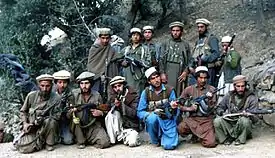Mohammad Yunus Khalis
Mawlawi Mohammad Yunus Khalis (alternate spellings Yunis and Younas) (Pashto: محمد يونس خالص; c. 1919 – 19 July 2006) was a mujahideen commander in Afghanistan during the Soviet–Afghan War. His party was called Hezb-i-Islami ("Party of Islam"), the same as Gulbuddin Hekmatyar's party. The two are commonly differentiated as Hezb-e Islami Khalis and Hezb-e-Islami Gulbuddin.
Mohammad Yunus Khalis | |
|---|---|
محمد يونس خالص | |
| Leader of Hezb-e Islami Khalis | |
| In office 1979–2006 | |
| Preceded by | position established |
| Succeeded by | Din Mohammad |
| Personal details | |
| Born | 1919 Khogyani District, Nangarhar Province, Afghanistan |
| Died | 19 July 2006 (aged 86–87) |
| Children | Anwar ul Haq Mujahid |
| Alma mater | Darul Uloom Haqqania, Akora Khattak, Khyber Pakhtunkhwa, Pakistan |
| Military service | |
| Allegiance | |
| Battles/wars | Soviet–Afghan War |

Biography
Belonging to the Khugiani tribe of Pashtuns,[1] Maulvi Mohammad Yunus Khalis was born in 1919 in Khogyani District, Nangarhar Province in Afghanistan and became a powerful figure in his country’s turbulent modern history. Educated in Islamic law and theology at the Darul Uloom Haqqania in Pakistan,[2] Khalis exercised influence through his conservative vision of Islamic society. Sometimes referred to as the don of Nangarhar, he was also a shrewd politician who wielded considerable power behind the scenes during one of the most turbulent and violent periods in his country’s history.
After the overthrow of Mohammad Zahir Shah by Mohammad Daoud in 1973, Khalis fled to Pakistan and joined Hekmatyar's Islamic Party (Hezb-e Islami). After the Soviet invasion of Afghanistan, Khalis broke with Hekmatyar and established his own party (Hezb-e Islami Khalis).
Khalis reportedly entered Afghanistan many times to join his forces in waging war against the Soviets and their local proxies. Many prominent mujahideen commanders including Abdul Haq, Amin Wardak Faisal Babakarkhail and Jalaluddin Haqqani were affiliated with Hezb-e-Islami Khalis.
After the fall of the Communist regime in 1992, Khalis participated in the Islamic Interim Government. He was a member of the Leadership Council (Shura-ye Qiyaadi), but held no other official post. Instead of moving to Kabul, he chose to remain in Nangarhar. His party controlled major parts of this politically and strategically important province. The Taliban brought Nangarhar under their control in September 1996 and Khalis was supportive of the Taliban movement and had a close relationship with Taliban commanders.
Khalis resided in Pakistan in the late 1990s. After the fall of the Taliban, his supporters regained their stronghold in Jalalabad where Khalis exerted considerable influence, although he held no official post. Two of his close associates, Haji Abdul Qadir and Haji Din Mohammad served as governors of Nangarhar Province after the fall of the Communist regime.
According to a statement from his son Anwar ul Haq Mujahid, leader of the insurgent group Tora Bora Military Front, Khalis died on 19 July 2006.[3]
Books
The author of many essays and poetry collections,[4] his publications include:[5]
Pashto
- Dīnī malghalirī, Kābul : Dawlatī Maṭbaʻh, 1957, 140 p. Fundamentals of Islam.
- Damūnah aw dāne : shiʻrī ṭolgah, Peṣhawar : Iḥsān Khparandwiyah Ṭolanah, 2002, 124 p. Pashto poetry.
- Da Islāmī ʻālam nan aw parūn : da Khāliṣ Bābā da khawro waro līkno tolkah, Peṣhawar : Iḥsān Khparndwiyah Ṭolanah, 2002, 91 p. Collection of articles arranged by ʻAbd al-Hādī Mulākhel.
Dari
- Islām va ʻAdālat-i Ijtimāʻī, Kābul : Anjuman-i Tarbīyah-ʼi Afkār, 1958, 326 p. Translation from Arabic of Sayyid Qutb's Social Justice in Islam.
References
- Abubakar Siddique, The Pashtun Question: The Unresolved Key to the Future of Pakistan and Afghanistan, Hurst, 2014, p. 154
- Ahmed Rashid, Taliban: The Power of Militant Islam in Afghanistan and Beyond, Bloomsbury Publishing, 2010, p. 90
- "Leader of Afghan mujahideen dies", BBC.co.uk, Monday, 24 July 2006.
- Masood Farivar, Confessions of a Mullah Warrior, Atlantic Books Ltd, 2009, chapter 10
- Profile on WorldCat
External links
- Biography at www.khyber.org
- Khalis and the Moderate Parties – Library of Congress country studies